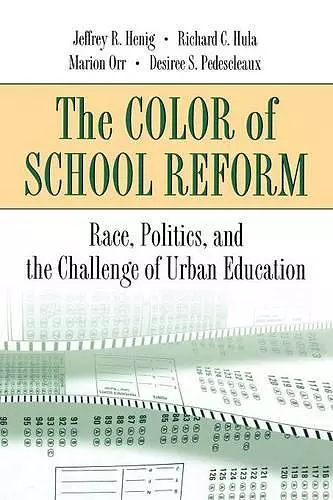The Color of School Reform
Race, Politics, and the Challenge of Urban Education
Richard C Hula author Jeffrey R Henig author Marion Orr author Desiree S Pedescleaux author
Format:Paperback
Publisher:Princeton University Press
Published:26th Feb '01
Currently unavailable, and unfortunately no date known when it will be back

Written with passion for its subject but cool in its analysis, The Color of School Reform is a much-needed comparative urban study. The authors demonstrate deep knowledge of their four cities, but rather than giving us simply a series of case studies, they organize their findings according to particular types of actors. This analytically more elegant structure facilitates our understanding of how school personnel, community activists, elected officials, and corporate leaders contribute to--or inhibit--the development of civic capacity. The use of theories drawn from a variety of fields makes this book accessible to a wide range of social scientists. -- Jennifer Hochschild, Harvard University Works on school reform that centralize the race variable are rare. Bringing together an unparalleled data set and a series of face-to-face interviews, The Color of School Reform generates new findings, rich insights, a powerful interpretation, and very wise policy recommendations. It is an interesting and intriguing, if not captivating, piece of scholarship. -- Hanes Walton, Jr., University of Michigan
Why is it so difficult to design and implement fundamental educational reform in large city schools in spite of broad popular support for change? This work examines education reform in Atlanta, Baltimore, Detroit, and Washington, DC, where local governmental authority has passed from white to black leaders.Why is it so difficult to design and implement fundamental educational reform in large city schools in spite of broad popular support for change? How does the politics of race complicate the challenge of building and sustaining coalitions for improving urban schools? These questions have provoked a great deal of theorizing, but this is the first book to explore the issues on the basis of extensive, solid evidence. Here a group of political scientists examines education reform in Atlanta, Baltimore, Detroit, and Washington, D.C., where local governmental authority has passed from white to black leaders. The authors show that black administrative control of big-city school systems has not translated into broad improvements in the quality of public education within black-led cities. Race can be crucial, however, in fostering the broad civic involvement perhaps most needed for school reform. In each city examined, reform efforts often arise but collapse, partly because leaders are unable to craft effective political coalitions that would commit community resources to a concrete policy agenda. What undermines the leadership, according to the authors, is the complex role of race in each city. First, public authority does not guarantee access to private resources, usually still controlled by white economic elites. Second, local authorities must interact with external actors, at the state and national levels, who remain predominantly white. Finally, issues of race divide the African American community itself and often place limits on what leaders can and cannot do. Filled with insightful explanations together with recommendations for policy change, this book is an important component of the debate now being waged among researchers, education activists, and the community as a whole.
Winner of the 2000 Best Book Award, Urban Politics Section of the American Political Science Association "[The authors] have plainly done their homework. They have reviewed thousands of news clips and official reports, conducted scores of interviews and surveyed a wide array of influential actors... Although the authors are plainly sympathetic to the aspirations of the reformers, they have checked their dreams at the door. That they do not shy away from telling inconvenient truths ... gives them greater credence to their account."--David L. Kirp, The Nation "This substantial volume does not leave the reader with great optimism. Rather, The Color of School Reform extends our understanding of the roots of urban school failure and broadens our focus on the political and social requisites for successful reform. At this stage of the big city school wars, that's a more important contribution."--Michael F. Addonizio, Qualitative Studies in Education
- Winner of American Political Science Association Urban Politics Section: Best Book Award 2000
ISBN: 9780691088976
Dimensions: unknown
Weight: 425g
320 pages